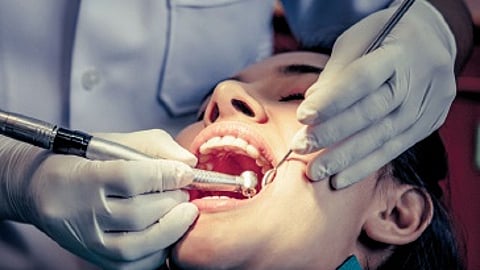

KOCHI: Every year, the World Oral Health Day falls on March 20. This year’s slogan for the day is ‘a happy mouth is a happy body’, which reiterates the need for the hour to keep the mouth healthy for overall well-being.
The oral cavity harbours a plethora of microorganisms and the frequent interplay among them decides the fate of symbiosis and dysbiosis among them. Adding to this microcellular pandemonium is the crosstalk between microbial flora and the host immune response.
Since the past several years, the lifestyle changes that have presented in daily life among people have been tremendous. One main outcome of this drastic lifestyle change is stress. Stress affects every system of our body, the stomatognathic system or the oral cavity is also not an exception. Let’s have a look at the stress-related dental problems.
Bruxism or teeth grinding: This is often found in people with sleep disorders and can lead to severe consequences such as frequent grinding, hypersensitivity of the teeth and abrasion. In the long run, it may even cause jaw joint problems.
Aphthous ulcers: Frequent oral canker sores or aphthous ulcers are often a product of excessive stress. It may affect movable oral mucosa such as the inside of the cheek, tongue, lip, etc. These lesions are very painful and often last for 10-14 days.
Dry mouth: Xerostomia is common due to reduced saliva production during stress. This will lead to a burning sensation on the tongue and inner surface of the cheek. It will get pronounced in diabetic patients as well as in women who have reached menopause. Two other results are a higher incidence of dental decay due to less saliva and bad breath.
Jaw joint pain: Stress often leads to frequent irritation to the temporomandibular joint and this jaw joint disorder can lead to neuromuscular dental problems. Recent studies show even shoulder and neck pain have some relation with uncorrected jaw joint issues
Periodontal or gum diseases: Stress often weakens immunity. Various studies from the University of North Carolina and Michigan have proved that stress can aggravate gum disease.
Tips for proper oral hygene
Engage in mindful activities
Allocate time for hobbies
Ensure adequate exercise in the sunlight
Maintain a well-balanced diet
Sleep for at least 6-8 hours a day
Refrain from vigorous toothbrushing. The proper practice should be to use a soft or medium toothbrush with a flexible handle and toothpaste in cream form.
Drink at least 10-12 glasses of water per day as dehydration will worsen the bad breath.
Share dental problems with the dentist and avoid unnecessary self-medication
Have antioxidant and vitamin-rich foods
Use topical antiseptic gels as per your dentists’ advice in aphthous ulcers
Avoid touching teeth unnecessarily and using fingernails, toothpicks, safety pins, etc, to remove the dislodged food particles
Many times, headaches, backaches, neck and shoulder pain, etc, may be due to teeth issues. Check for biting issues and aberrations, if the rest of the medical causes are ruled out